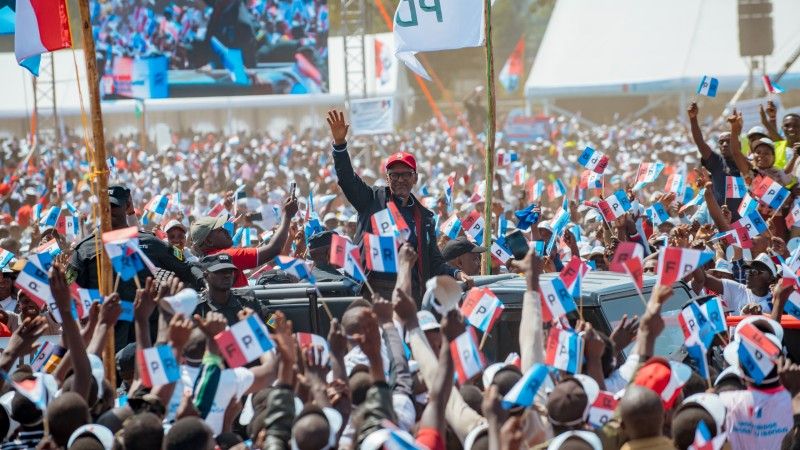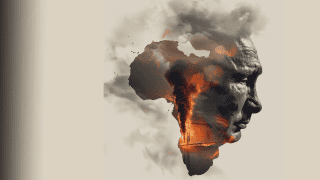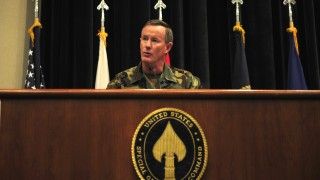- WIADOMOŚCI
- ANALIZA
Kagame Once Again President of Ambitious Rwanda
It’s now 30 years since the genocide against the Tutsi population. Rwanda seems to be emerging from the shadow of these events and has become one of the most dominant countries in the region. On July 15, in the presidential elections, the ruling strongman Paul Kagame confirmed his dominance for the 4th time, winning over 99% of all votes. The elections took place amid Rwanda’s aggressive foreign policy in the Great Lakes region, particularly towards the Democratic Republic of Congo.

Paul Kagame has served as the president of Rwanda three times already. He first came to full power in 2000 when he was appointed by parliament following the resignation of the previous president, Pasteur Bizimungu. He was then elected president in the 2003 elections and again in 2010. In 2017, he won for the third time, allowing him to remain in office until 2024. Constitutional changes in Rwanda, enacted in 2015, theoretically allow him to remain president until 2034.
On July 15, the incumbent Kagame once again demonstrated his dominance in the race for the presidency. Rwanda is developing at an extraordinary pace, as if putting the genocide behind it and not looking at the situation of other countries in the region, which have stalled in economic, military, and technological development. Why would society want to change this?
Appearances (Can Be) Deceptive
The previous presidential and parliamentary elections in Rwanda took place in 2017. At that time, the incumbent president Paul Kagame, who has been in power continuously since 1994, achieved a result close to 99%. The political process and election campaign were marked by unfair practices such as isolating and intimidating opponents. In the recent elections, Kagame’s power was maintained, and some observers claim that he might remain head of state for life. The authoritarian actions of the current president are supported by the Rwandan Patriotic Front (RPF), which suppresses the opposition in every possible way.
Practically all political life in Rwanda revolves around Paul Kagame. Attempts to contest his position are met with repressions such as preventing participation in presidential elections. This situation is exemplified by Victoire Ingabire Umuhoza, who wanted to run for president but was excluded from the race due to a previous arrest for „inciting divisions and conspiring against the government.” For her „behavior,” Umuhoza spent 8 years in prison and was only released in 2018. The list of candidates who did not participate in the democratic process is long, including politician Diane Rwigara.
The only registered rivals of Kagame in the conducted elections were Frank Habineza from the Democratic Green Party of Rwanda, who received 0.45% of the votes in the 2017 elections, and Philippe Mpayimana. The National Electoral Commission presented the full list of candidates on June 14 and officially confirmed the competition of the above-mentioned trio. This was related to the failure of 6 other potential candidates, who were not affiliated with any political group, to meet the general formal requirements. Historical experience suggested another 5-year term for Paul Kagame as head of state.
Over the years, Kagame and the RPF have controlled the national opposition and intimidated and isolated regime critics living abroad. Another practice is the strict control of the media, which in extreme cases are forced to emigrate outside Rwanda, although even this does not seem helpful, as Kigali blocks access to news services and websites operating outside the country’s borders. The amended criminal code of 2018 penalizes acts such as caricatures and unfavorable writings with an „anti-Kagame” tone. Moreover, there is no model separation of powers in Rwanda, as the judicial branch is appointed by the president and approved by the senate dominated by the RPF.
Who is Paul Kagame?
The current president of Rwanda, Paul Kagame, spent his youth in Uganda due to the persecution of the Tutsi population by the majority Hutu, who politically dominated Kigali after it gained independence. In 1979, Kagame joined the National Resistance Army in Uganda and fought as a guerrilla against the government of Ugandan President Milton Obote in what was known as the „Bush War.” Six years later, together with his friend Fred Rwigema, the young Kagame founded the Rwandan Patriotic Front (RPF), which included Rwandan Tutsi refugees.
The turbulent 1990s in Rwanda were marked by the outbreak of the civil war, Kagame’s leadership of the RPF, the facade of the Arusha Accords, and the horrendous genocide. The defeat of the government forces and the Interahamwe and Impuzamugambi militias by the Inkotanyi (Tutsi militias) elevated the leader of the Rwandan Patriotic Front to the position of vice president and minister of defense, roles he held until 2000, after which he became head of state.
As vice president and minister, Kagame was particularly active during the civil wars in the Democratic Republic of Congo from 1996-1997 and 1998-2003. Rwanda supported Tutsi fighters who were battling Hutu militias. This background explains his current activities and support for the M23 group, which is gaining territory in eastern DRC.
Under Paul Kagame’s leadership, Rwanda has experienced dynamic economic growth and political stability. This was achieved through numerous programs aimed at social cohesion, creating a „new Rwandan” (without historical baggage), and abandoning the previous Tutsi-Hutu-Twa ethnic divisions. In practice, however, Kagame favored Tutsis and his supporters from the Rwandan Patriotic Front. Nonetheless, it cannot be denied that the current president has transformed Rwanda into what is described as a prosperous „African tiger.” For instance, the electrification rate increased from 15% to 76% over ten years in a society of nearly 14 million people.
The dark side of Kagame’s 24-year presidency has been the drift towards dictatorial and authoritarian tendencies, in which he restricted political pluralism, curtailed media freedom, and created government-dependent press, television, and radio. These factors were also present in this year’s election campaign, which was devoid of democratic competition.
The Strongest Instrument in the Hands of the President
Paul Kagame’s leadership and autocracy are founded on the history of the genocide and the reconciliation policy pursued after 1994. The model of a Rwandan proposed by the president and the RPF was part of the transitional justice period and aimed to lead to the peaceful recomposition of Rwandan society without reference to Hutu, Tutsi, or Twa. However, an unintended consequence was the strengthening of the repressive apparatus and security forces.
The military remains one of the most influential institutions in the country, and observers estimate that „generals” will be the ones competing for Kagame’s succession in the future.
Rwanda’s foreign policy has recently focused on maintaining influence in the eastern Democratic Republic of Congo (DRC) by funding the M23 group and preventing the strengthening of the Democratic Forces for the Liberation of Rwanda (FDLR; mainly Hutu), which conducts subversive actions against Kigali. The escalation of events in eastern DRC and the lack of willingness to reconcile between Kagame and Thisekedi threatens the outbreak of another Congolese war.
Another theater of operations is northern Mozambique, specifically the Cabo Delgado province, where terrorists from Ahlu Sunnah wa Jama’a (ASWJ; „Al-Shabaab”) have been active since 2017. In April 2024, Kagame decided to reinforce the Rwandan contingent operating in Mozambique (partly because the SADC mission ends in 2024). Rwanda’s fight against the terrorist threat in Mozambique is financially assisted by the European Union, which allocated nearly 20 million euros in 2022 to support Rwandan efforts in Mozambique. In June this year, EU insiders revealed that the European Peace Facility would allocate 40 million euros for „non-lethal equipment” and air transport for the Rwandan contingent.
Notably, the Rwandan mission protects the energy infrastructure of the French entity TotalEnergies, which costs Kigali 10 million dollars a month. However, Rwanda hopes to secure favorable contracts from the Mozambican authorities and foreign oil companies. This scenario is already being realized, as the mentioned TotalEnergies hired the Rwandan company Radar Scape (linked to the Rwandan Patriotic Front) to build a 5 MW solar power plant in Mozambique’s Cabo Delgado province.
Rwanda also emphasizes its role in the region through security activities in the Central African Republic, where it trains Central African troops and eliminates terrorist threats from the Islamic State’s Central Africa Province.
What Course After the Elections?
Paul Kagame’s victory in the July elections was a certainty. The elections turned into a symbolic plebiscite cementing the leader’s position. The most striking confirmation is the election result – an absolute victory for Paul Kagame, who received 7,099,810 votes, giving him a final result of 99.15%. His two opponents didn’t even come close to this result, as Frank Habineza received only 38,301 votes (0.53%), and Philippe Mpayimana got 22,753 votes (0.32%). A notable aspect of the elections was the very high turnout, both in the presidential election (7,160,684 voters out of 9,071,157 possible) and in the parliamentary elections (8,730,059 voters), in which the RPF coalition dominated other parties with 62.67%.
This signifies the continuation of the established political line within Rwanda and in the Great Lakes region. The instrumentalization of the military and the prominence of security forces in the Rwandan system suggest that Kagame’s future actions will involve controlling high-ranking military officials to avoid a military coup (in 2023, Kagame retired 12 generals and dozens of officers). The marginalization of the Armed Forces« apparatus resulted from presidential fears stemming from a wave of military coups in African countries.
Kagame’s triumph also means the continuation of a „safe zone in Rwanda,” which will remain free from potential Russian influences. Kigali’s policy is based on the principle of „African solutions for African problems,” so dependence on the Kremlin and the African Corps is not a realistic scenario. It is worth noting that both Kigali and Moscow are engaged in (limited) competition in the Central African Republic.
Polish Accent
This situation is also a positive signal for Poland, as Rwanda remains a key partner in Sub-Saharan Africa. Internal stability and the continuation of the current course allow for the implementation of bilateral agreements. Since December 1, 2022, the operationalization of the Polish embassy in Kigali has been underway, while Rwanda opened its embassy in Warsaw on October 7, 2021. Poland and Rwanda are in a favorable moment of cooperation, with trade volumes steadily increasing. In recent years, important exports for Poland have included weapons, ammunition, and military accessories, followed by grains, agricultural machinery, and electronic equipment. Several Polish companies are permanently present in Kigali, and approximately 1,500 Rwandan students are studying in Poland.
It is evident that Kigali is currently seeking foreign partners. Countries willing to invest in Rwanda and develop joint projects are welcomed with open arms. On one hand, Rwanda represents a very stable and transparent market by African standards. On the other hand, Rwanda’s very aggressive foreign policy in the region and its willingness to cooperate economically with Russia and China should be considered. At the moment, Rwanda is a very interesting ally that should serve as a foothold for Poland to expand its presence on the African continent. Rwanda is also a purchaser of Polish armaments, which could lead to inquiries from other countries in the region.
Rwanda, as one of the few African countries, can boast a relatively functioning democracy where elections are held. Additionally, it is one of the fastest-growing countries on the continent. Since the current relationship with President Kagame is good, and he is likely to rule for at least another decade, opportunities for further cooperation should be sought. Simultaneously, since Poland is considering opening a diplomatic mission in Rwanda and maintained one in the DRC until 2008, it might be worth pursuing a bilateral approach and conducting an open cooperation policy with both Kinshasa and Kigali. Let African partners demonstrate their readiness to cooperate with Warsaw, which does not have a colonial past but a positive missionary and scientific presence.
And Nothing Changes…
Despite the authoritarian tendencies of Kagame’s regime, he remains a preferred partner for the European Union and many United Nations member states. This is because Kigali continues to combat terrorist threats in the Great Lakes region. Furthermore, Rwanda has troops in Mozambique, following the departure of the Wagner Group, and it prevents the Central African Republic from being dominated by Wagner forces by sending its own soldiers. It is clear that Rwanda is a country to be reckoned with.
Maintaining close relations solely with Rwanda could antagonize relations with the DRC, Burundi, and Uganda. European cooperation with Paul Kagame might lead to intensified disinformation campaigns directed by Moscow, portraying EU activity in Africa as neocolonialism and imperialism. This also signals to Kinshasa that it might strengthen its cooperation with Russia and China if the broadly defined West does not offer valuable projects from Congo’s perspective. Uncritical cooperation with Rwanda also implies a tacit approval of the destabilization of eastern DRC, which could result in another Congolese war and a wave of migration towards Europe.
Authors: dr Aleksander Olech, Konrad Markiewicz















